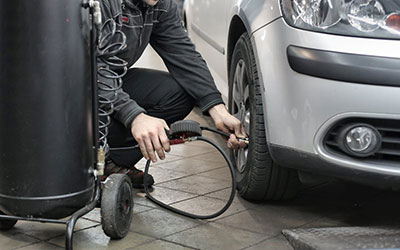
Why Do My Car Tires Keep Going Flat?A flat tire can be a huge inconvenience, making you late to work or throwing your weekend road trip completely off schedule. Flat tires are a huge time waster and an added expense that is best avoided where possible. There are many reasons that tires can deflate, from more obvious than others. In this article, we look at how often you should inflate your tires, why you might get a flat and what steps you can take to prevent it from happening: How often should I inflate my tires? There is no one correct answer to how often you should inflate your tires but having tires with poor air pressure can reduce your car's fuel economy, increase the likelihood of a tire blowout and increase stopping distance and wear and tear. It is a good idea to get into the habit of checking your tire pressure once a month. While this is good practice, you are unlikely to need to re-inflate them each month. If you find that they deflate often, this could be a sign of a slow puncture and suggests you may need to either repair or replace your tire with a high quality brand like Atturo. Remember to look up the manufacturer's recommended tire pressure for your vehicle. Why does the air get out of my tires? Cold weather The cold weather faced in winter is a very common cause of air loss in tires. Cold air causes the pressures to drop and for every ten degrees lost in temperature, a tire can lose one pound per square inch of pressure. The opposite happens during hot weather. Air expands in the heat, this can put pressure on the tire and cause air to leak out of the seal. There isn't much that can be done to prevent this from happening apart from storing your car in a temperature-controlled shelter when not in use. Poor sealant Poor sealant is actually another common reason for a tire losing pressure. If the sealant has a gap or is not applied correctly when the tire is manufactured, it will allow air to escape. You will notice this when needing to re-inflate your tire on a regular basis. Or, if the wheel edge of the car is damaged, the seal may not be able to prevent air from escaping from where the damage is located. Tire damage Damage to the tire itself may also be an issue. Whilst tires are generally quite resilient, very rigid, and very small objects can cause a slow puncture. Road debris is everywhere, and a small piece of litter, gravel or pebbles can cause this type of damage. Valve stem leakage While you might check the tire itself for damage in the event of a flat tire, it could be the valve stem that is at fault. The valve stem is the part of the tire you attach a pump to inflate it. Air can leak if the valve or stem has been manufactured poorly or if it is damaged whilst driving or while the tire is being mounted. Age Lastly the age of the tire is a factor, many people do not replace their tires soon enough. An aged tire can get worn out and more likely to have cracks in it, making it less able to hold air. What preventive measures can I take? It is almost impossible to avoid damage caused by driving over small objects in the road, this is an event that impacts nearly everyone at one time or another. However, monitoring your tire pressure can help you to fix air leaks before your tire becomes flat. Many modern cars now have sensors that monitor tire pressure and automatically alert you to an issue. However, even with these in place it can be wise to check pressure manually now and again in case these sensors are not working as they should. |